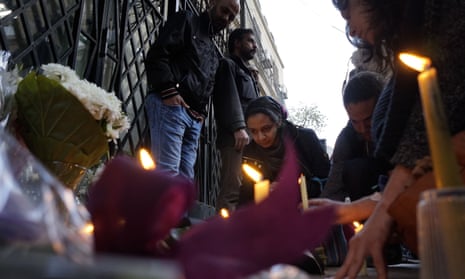An Italian student found dead in Cairo last week was killed by a violent blow to the base of the head after suffering other fractures, investigators in Rome have reportedly discovered.
Giulio Regeni died when a vertebra in his neck was fractured, according to autopsy results reported by Ansa news agency. The body of the 28-year-old, found on a Cairo road on Wednesday, was also covered in abrasions and other injuries including fractures.
His body reportedly underwent a CAT scan and toxicology tests in an autopsy carried out immediately after its return to Rome on Saturday, Ansa said. Italian authorities have not independently confirmed the coroner’s findings.
A vigil is expected to be held for the PhD student in his home town of Fiumicello, north-east Italy, before his funeral on Tuesday. The return of Regeni’s body to Italy followed a gathering of mourners at the Italian embassy in Cairo, where friends left white gladioli, roses and candles.
Regeni’s disappearance on 25 January, on a day of heightened security as Egypt marked five years since the 2011 uprising, sparked fears that he was killed by Egypt’s security forces. One observer carried a sign reading “Those who killed Giulio are the same murderers who kill Egyptians”.

The autopsy in Rome followed another examination by Italian investigators in Cairo, at the Italian hospital in the Egyptian capital.
Egypt has promised full cooperation with the Italian team that arrived in the country on Friday, although the Italians do not have access to all of Egypt’s investigation.
“The Italians were not participating in the autopsy report and no one from the Italian consulate was present during the autopsy,” said Shaaban el-Shamy, Egypt’s deputy minister of justice, who added it was standard procedure to not share certain aspects of the investigation.
“The Italian investigators are supposed to collaborate with the security apparatus in charge and with the prosecution but not with the morgue and the autopsy,” he explained. “This is their role to play, they have the right to do their own autopsy after they receive the corpse. They have not contacted the Egyptian morgue or the investigations team for their reports.”
Questions over whether the Egyptian and Italian teams are running two parallel investigations extend into the Giza public prosecutor’s office, which is tasked with maintaining contact with lawyers from the Italian embassy in Cairo. Friends of Regeni, including a German and an Italian national, have been questioned by the office of the Giza public prosecutor, Ahmed Nagy, who emphasised that lawyers from the Italian embassy are given access to the office’s findings. “It is procedure to talk to the lawyers, they have the right to know everything,” he said.
Sources at the Italian embassy, which has declined to make a public statement on Regeni’s death, explained that while full cooperation is sought from Egyptian authorities, it cannot be forced.
Mourners who gathered at the Italian embassy on Saturday remembered Regeni as a scholar but also as a symbol of what they say is a widespread pattern of abuse by Egyptian security forces.
“I think we owe it to everyone to be clear how the police are in Egypt,” said the human rights activist Mona Seif. “The news of Egypt that reaches the international community looks at human rights violations and targeting people. But with the random way things are, it’s always possible to become a victim to accident and unnecessary detention. We need to talk about how living day to day is for those not with any political affiliation.”
A report by Egypt’s commission for rights and freedoms published in December counted that 340 people, or three each day, were forcibly disappeared by security forces between August and November 2015. The report also highlighted the frequent torture of detainees.
